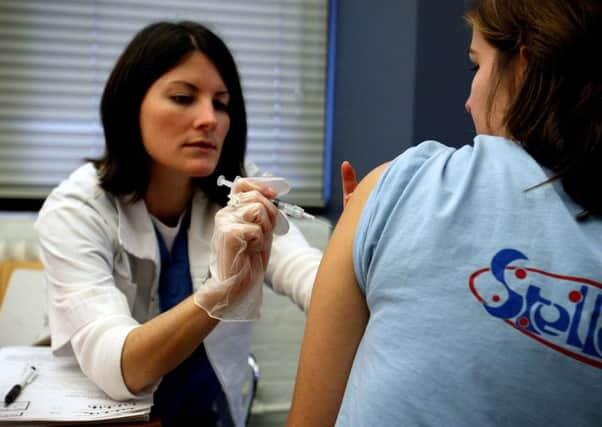Kevan Christie: Vaccination success story is too often taken for granted


In the past few months, French scientists have successfully treated a teenager’s Sickle Cell disease by tweaking his DNA, while a US team has grown a lamb in an artificial plastic womb, a development which could help keep premature babies alive. The thing about these astonishing, headline-grabbing feats is that over time they become taken for granted.
So it goes with immunology. Within recent history people were more terrified of catching sniffs and snuffles than they were of one of our bigger killers, cancer.
Advertisement
Hide AdAdvertisement
Hide AdAround a century ago around 100 million people across the globe perished during the Spanish Influenza pandemic. Words like flu and measles used to strike terror into people’s hearts – now thanks to the humble vaccine, they elicit nothing more than a shrug.
Smallpox once routinely killed around 2.5 million people per year, but thanks to a worldwide campaign the disease was officially eradicated in 1980.
Vaccines have contributed more to the health and well-being of humans than any other medical development. Indeed in the last 60 years, immunisation has saved the lives of more children than any other medical intervention.
More recently resistance has grown about the Human Papillomavirus (HPV) vaccine to prevent cervical cancer. This was the first vaccine ever developed to fight cancer. It is available free on the NHS for girls aged 11 to 13 years in secondary schools across Scotland.
The majority of resistance to the HPV vaccine has stemmed from the United States where a moral argument has raged around the issue with regard to youngsters going on to have sex.
Religious conservatism is in favour of abstinence in lieu of a vaccination that may protect young people from perceived dangers of having sex, therefore the jab accordingly may actually encourage promiscuity.
However, researchers at Health Protection Scotland have shown a 90 per cent reduction in the types of HPV most commonly associated with cervical cancer and a significant reduction in the incidence of cervical pre-cancer since the vaccine was made available in 2008.
This is a fantastic success story, with high street chemists reporting a staggering 200 per cent increase in sales of the HPV vaccination in the period from December 2016 to February 2017. Incredibly, in spite of these type of achievements, public distrust of immunisation is on the increase.
Advertisement
Hide AdAdvertisement
Hide AdIn the late 90s Dr Andrew Wakefield launched a campaign claiming a link between the MMR vaccine and autism. The link has been firmly disproven and Dr Wakefield has since been struck off the medical register.
Thanks to his campaign, however, many children still go without their MMR immunisation because their parents’ fears override the bare facts – that, for example, mumps was once the biggest cause of childhood deafness and that, up until the 1970s, measles killed millions of children annually.
Immunisation is something we take for granted, yet it has a vast impact.
Here in Scotland we have access throughout our lives to vaccines that make our lives last longer and keep us healthy. It’s definitely worth remembering the vital role this service plays in protecting us.